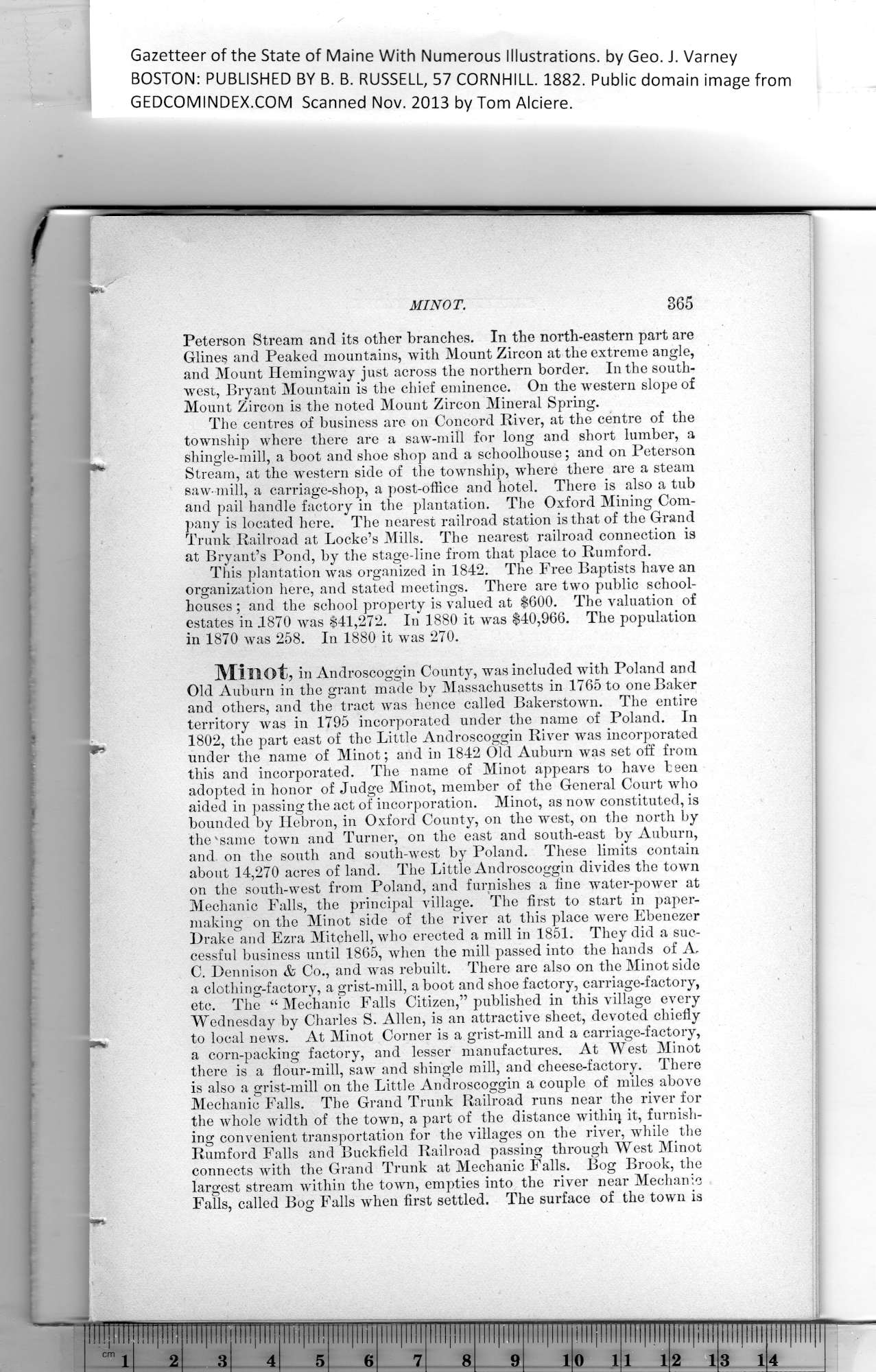|
Gazetteer of the State of Maine With Numerous Illustrations, by Geo. J. Varney
BOSTON. PUBLISHED BY B. B. RUSSELL, 57 CORNHILL. 1882. Public domain image from
MINOT. 365
Peterson Stream and its other branches. In the north-eastern part are
Glines and Peaked mountains, with Mount Zircon at the extreme angle,
and Mount Hemingway just across the northern border. In the south-
west, Bryant Mountain is the chief eminence. On the western slope of
Mount Zircon is the noted Mount Zircon Mineral Spring.
The centres of business are on Concord River, at the centre of the
township where there are a saw-mill for long and short lumber, a
shingle-mill, a boot and shoe shop and a schoolhouse; and on Peterson
Stream, at the western side of the township, where there are a steam
saw-mill, a carriage-shop, a post-office and hotel. There is also a tub
and pail handle factory in the plantation. The Oxford Mining Com-
pany is located here. The nearest railroad station is that of the Grand
Trunk Railroad at Locke’s Mills. The nearest railroad connection is
at Bryant’s Pond, by the stage-line from that place to Rumford.
This plantation was organized in 1842. The Free Baptists have an
organization here, and stated meetings. There are two public school-
houses ; and the school property is valued at $600. The valuation of
estates in 1870 was $41,272. In 1880 it was $40,966. The population
in 1870 was 258. In 1880 it was 270.
Minot, in Androscoggin County, was included with Poland and
Old Auburn in the grant made by Massachusetts in 1765 to one Baker
and others, and the tract was hence called Bakerstown. The entire
territory was in 1795 incorporated under the name of Poland. In
1802, the part east of the Little Androscoggin River was incorporated
under the name of Minot; and in 1842 Old Auburn was set off from
this and incorporated. The name of Minot appears to have been
adopted in honor of Judge Minot, member of the General Court who
aided in passing the act of incorporation. Minot, as now constituted, is
bounded by Hebron, in Oxford County, on the west, on the north by
the'same town and Turner, on the east and south-east by Auburn,
and on the south and south-west by Poland. These limits contain
about 14,270 acres of land. The Little Androscoggin divides the town
on the south-west from Poland, and furnishes a fine water-power at
Mechanic Falls, the principal village. The first to start in paper-
making on the Minot side of the river at this place were Ebenezer
Drake and Ezra Mitchell, who erected a mill in 1851. They did a suc-
cessful business until 1865, when the mill passed into the hands of A.
C. Dennison & Co., and wras rebuilt. There are also on the Minot side
a clothing-factory, a grist-mill, a boot and shoe factory, carriage-factory,
etc. The “ Mechanic Falls Citizen,” published in this village every
Wednesday by Charles S. Allen, is an attractive sheet, devoted chiefly
to local news. At Minot Corner is a grist-mill and a carriage-factory,
a corn-packing factory, and lesser manufactures. At West Minot
there is a flour-mill, saw and shingle mill, and cheese-factory. There
is also a grist-mill on the Little Androscoggin a couple of miles above
Mechanic Falls. The Grand Trunk Railroad runs near the river for
the whole width of the town, a part of the distance within it, furnish-
ing convenient transportation for the villages on the river, while the
Rumford Falls and Buckfield Railroad passing through West Minot
connects with the Grand Trunk at Mechanic Falls. Bog Brook, the
largest stream within the town, empties into the river near Mechanic
Falls, called Bog Falls when first settled. The surface of the town is
PREVIOUS PAGE ... NEXT PAGE
This page was written in HTML using a program written in Python 3.2
|
